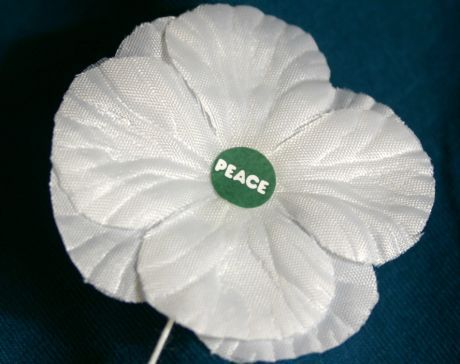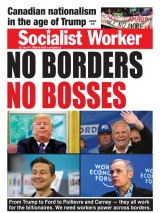Columns
You are here
To remember is to end all war

November 11, 2017
This November 11, as every year, Remembrance Day will be the day for governments to tout nationalism and parade veterans as emblems of the “fight for freedom.”
Remembrance Day historically is a memorial day observed in Commonwealth of Nations member states since the end of the First World War to remember members of their armed forces who have died in the line of duty. The day is now marked by ceremonies in many non-Commonwealth countries. Remembrance Day is observed on 11 November in most countries to recall the end of hostilities of World War I on that date in 1918. Hostilities formally ended "at the 11th hour of the 11th day of the 11th month", in accordance with the armistice signed by representatives of Germany and the Entente. The First World War officially ended with the signing of the Treaty of Versailles on 28 June 1919.
In this official history the forces for “good”—Britain and its allies, including Canada—fought the good fight for “democracy” and “freedom” against the terrible Germans who were the enemies of all that Western democracies supposedly represented.
You will never hear in the official story the real truth about the Great War: that millions of ordinary soldiers on all sides were sacrificed for the imperial interests of their respective governments.
Imperialism
This is what Russian revolutionary Vladimir Lenin wrote about the First World War, the so-called 'war to end all wars': "The war of 1914-18 was imperialist (that is, an annexationist, predatory, war of plunder) on the part of both sides; it was a war for the division of the world, for the partition and repartition of colonies and spheres of influence of finance capital."
When the war began, the majority of working class people from all nations were drawn into the patriotic fervour that often accompanies the drive to war, disguised as it is in the flowery words of courage, self-sacrifice and jingoistic nationalism.
About 10 million people were killed or died, as a result of WWI. It was the first “modern” war that introduced killing on an industrial scale. This was combined with elements of 19th century warfare which translated into barbaric practices, such as generals intent on using cavalry and bayonets in a situation of entrenched warfare and machine guns. Soldiers would be sent out of trenches on mass to be mown down by machine guns on the other side. Millions of lives were lost and all for a few yards of gained territory.
Wilfred Owen, who wrote some of the best British poetry on World War I and told the truth about the horrible carnage of the war, composed nearly all of his poems in slightly over a year, from August 1917 to September 1918. In November 1918 he was killed in action at the age of twenty-five, one week before the Armistice.
This is from one of his most famous poems 'Dulce et Decorum Est', about the effects of poison gas on a soldier:
If in some smothering dreams, you too could pace
Behind the wagon that we flung him in,
And watch the white eyes writhing in his face,
His hanging face, like a devil’s sick of sin;
If you could hear, at every jolt, the blood
Come gargling from the froth-corrupted lungs,
Obscene as cancer, bitter as the cud
Of vile, incurable sores on innocent tongues,—
My friend, you would not tell with such high zest
To children ardent for some desperate glory,
The old Lie: Dulce et decorum est
Pro patria mori. [It is good and great to die for your county.]
The scourge of imperialist war has continued unabated since the Great War. And the patriotic lies continue unabated as well. The Western powers claimed that WWII was a war against fascism, and indeed for many soldiers and resistance fighters, it was just that. But Western governments were incredible hypocrites about their reasons for entering the war. Winston Churchill, for example, was initially a supporter and admirer of Hitler, until he realized that Germany's imperial interests were encroaching on Britain's own.
And, in fact, it would have been entirely possible for Western governments to bomb the rail lines shipping Jews and others to the concentration camps, since they were aware of the camps long before the war ended, but this was never done.
The ongoing wars in the Middle East in this century and the last have laid waste to once functioning societies, such as Iraq, where the use of phosphorous gas and other chemical weaponry rained down misery on the civilian population. Artillery guns fired white phosphorous rounds that create a screen of fire that can't be extinguished with water. People reported being attacked with a substance that melted their skin.
And all this human misery and suffering for a war based on a lie, that Iraq possessed weapons of mass destruction, when it was Western imperialist countries that used these weapons on people whose only crime was living in a region that was important to Western oil interests.
This is not to say Western imperialist powers have any more sympathy for their own soldiers, who they routinely use as cannon fodder, to fight and die for their rulers' interests. Witness the large number of veterans living homeless on the streets of the US and Canada, with little or no access to adequate health care or resources to deal with problems such as PTSD.
And now we have the spectre and folly of nuclear war raising its ugly head once again with Donald Trump and his posturing around North Korea. No wonder that Trump was confronted with thousands of South Korean protestors opposed to Trump's threats and war-mongering during his recent visit.
What imperial arrogance and inhumanity to boast in front of a Japanese audience, as Trump did, that the United States is to be feared by any who oppose it—this in living memory of the horrific nuclear attacks the US visited on Japan during WWII.
Resistance and revolution
The history of war is not a history without resistance on the part of ordinary people. We are the ones who fight and die in ruling class wars. No matter the patriotic spin our rulers put on their militaristic adventures war under capitalism is always "a war for the division of the world, for the partition and repartition of colonies and spheres of influence of finance capital."
The anti-Vietnam war movement inside the US helped to bring the biggest bully to heel for a number of years, alongside the courageous struggles of the Vietnamese people themselves. Millions participated in a global anti-war movement against the wars in Iraq and Afghanistan. Here in Canada the anti-war movement was able to forestall Canada's participation in the Iraq war by bringing out hundreds of thousands of protestors across the country, most impressively in the streets of Montreal, where half a million people protested Canada's potential involvement in that war.
But in this year, the 100th anniversary of the Russian revolution, we can look back to a movement that inspired soldiers on all sides to end the bloody carnage that Wilfred Owen and other wartime poets wrote about so movingly.
It's not true that any side “won” the First World War. World War I ended, not because of a glorious victory by one or the other of the imperialist blocs that were vying for new territory and spheres of influence, but because the world working class, led by the example of Russia, entered onto the stage of history, not as victims, but as creators of their own destiny. In the words of Leon Trotsky, "The history of a revolution is first of all a history of the forcible entrance of the masses into the realm of rulership over their own destiny”.
The Bolsheviks' slogan “Peace, Bread and Land” spoke to the yearning of ordinary soldiers, peasants and workers to take control of their destiny. Soldiers mutinied not only in Russia but also in France and Germany, because the experience of the war had turned them against their own rulers and made them realize that they were being used as human battering rams against working class soldiers from other nations who also had nothing to gain from the wholesale slaughter.
That's why it would be much more fitting to remind ourselves this Remembrance Day of how much suffering and unnecessary death capitalism has wrought and to commit ourselves to ending a system where unending war is the natural by-product of imperialist competition.
Section:










